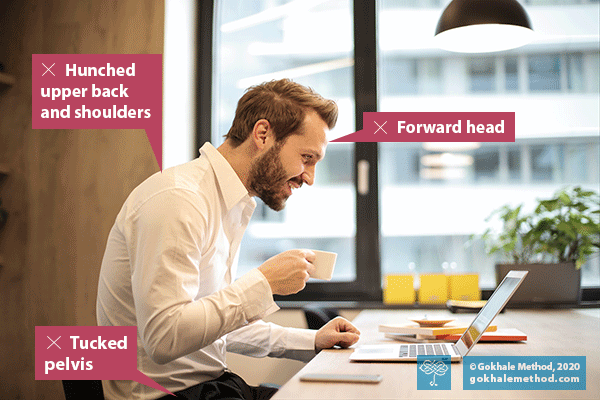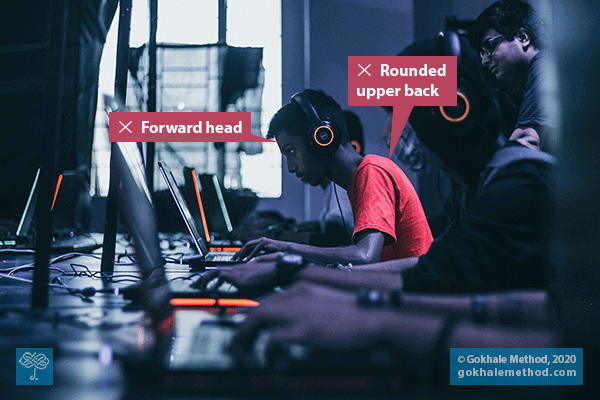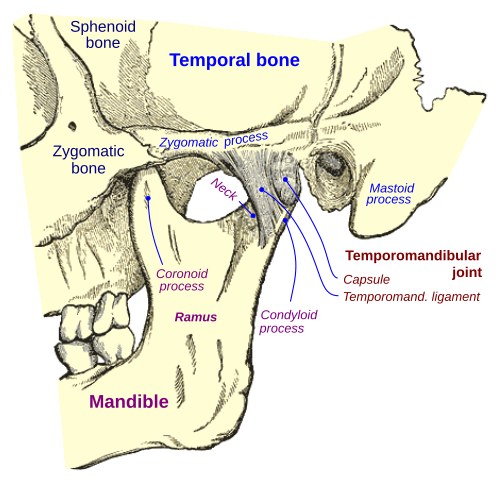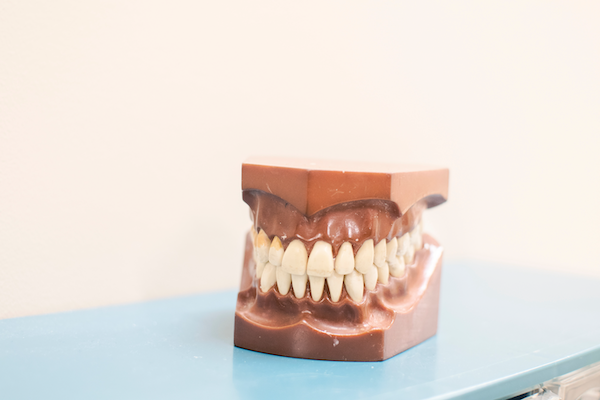How Bad Posture Can Crack Your Teeth — and How to Avoid It

According to Dr. Tammy Chen’s NY Times column, dental patients are suffering from an “epidemic of cracked teeth” due in part to posture. How can we avoid a similar fate? Image courtesy Engin Akyurt on Unsplash.
I recently came across a New York Times column by Tammy Chen, DDS, a prosthodontist with a practice in Manhattan, describing the “epidemic of cracked teeth” she’s seen in her patients during the COVID pandemic. Dr. Chen names two suspected culprits: the slumped posture many people adopt while working from home with improvised furniture, and excessive anxiety and stress. Both of these culprits lead to jaw clenching and tooth grinding.

This man’s C-spine — an intensely rounded upper back and tucked pelvis — are all too common in people working from home and on laptops. As Dr. Chen pointed out, such postural habits can have deleterious effects on the jaw.
The dangers of a C-spine
While working remotely, people are slumping and hunching at their computers more than ever before. For many unaware of how to sit healthfully, lack of access to office workspaces (and in some cases, ergonomic furniture) has been difficult to adjust to. Anyone plagued by a C-spine — with an intensely tucked pelvis below rounded, hunched shoulders — is doing themself some real damage if they don’t learn new ways of using their body. I’m always calling out the unhealthy stresses this puts on discs, nerves, bones, and ligaments in the back and neck, but the consequences of poor posture don't stop there.

Gaming posture also often tends toward a C-spine, to the detriment of gamers’ long-term spinal health, as well as jaw health.
As Dr. Chen points out, nerves passing through the neck and shoulder lead directly to the temporomandibular joint (TMJ). TMJ dysfunction is a widespread problem in our culture and can lead to pain, clicking, and popping in the jaw. So it stands to reason (and I’ve seen in my decades teaching) that hunched, slumped posture in the upper body, including the neck and shoulders through which nerves pass, has detrimental effects on the jaw.

The temporomandibular joint (TMJ) connects the jaw to the skull. Original image courtesy Wikipedia user Jmarchn under CC BY-SA 3.0.
Healthier posture = healthier teeth
Thankfully, learning new and healthful ways of using the upper body while sitting and sleeping is within all of our reach. When sitting, the alternative to collapsing into a C-spine is to first fix the foundation of the spine, which is the pelvis. When the pelvis is tucked under, it provides a wonky base for the spine to rest on. Like a building with poor foundations, the spine is then distorted as a consequence, rounding out the back to then cantilever forward with the upper body. This obliges the muscles in the neck and shoulders to do overtime supporting the substantial weight of the head, creating tension and compression all the way through to the jaw.
The remedy is to learn to position the pelvis well by stretchsitting or stacksitting — so named because they either allow the spine to stretch out straight (stretchsitting), or for the bones of the spine to stack upright and relaxed (stacksitting). Both enable sustainable shoulder placement, and a well positioned neck and head. Bingo! Their harmonious arrangement of bones and soft tissues gives our nerves the space and pathways they need to function happily.

Our jaws and teeth are among the body parts where anxiety and stress most noticeably take their toll. Image courtesy Nhia Moua on Unsplash.
Anxiety and stress affect the jaw
Jaw clenching and tooth grinding at night while sleeping are typically the result of anxiety and stress, both of which are increasingly common in 2020. This added pressure and friction on the dental surfaces are another factor Dr. Chen suspects in the high number of cracked teeth she’s seen in her practice since June. How can posture help here?

Learning stretchlying brings our students a level of comfort and rest many have never experienced before. Image courtesy Minnie Zhou on Unsplash.
The luxuriously comfortable and relaxed postures we teach for sleep help relieve tension all throughout the body and improve sleep quality. Better, deeper sleep gives us a more stable footing on which to meet the day, even in stressful settings, and can help our mental health considerably. Why not take steps to improve our sleep quality if it can help our health, both mental and dental?
We recommend stretchlying on the back because it supports and gently tractions the body in ways that allow muscles that have been overworking to finally relax, releasing their grip on the back, the neck and, yes, the jaw. It may seem surprising to link healthy posture and dental health, but it actually makes perfect sense that jaw tension and teeth grinding can have positional causes.
If you’d like to revamp your understanding of comfort and perhaps invest in something other than your dentist’s next vacation, try an Online Initial Consultation with one of our online teachers. We also have a new Free Online Workshop all about how you can use posture to relieve stress! We look forward to supporting you (and your pearly whites) in these challenging times.

Comments
thank you Esther
thank you Esther
Interesting correlation!
Interesting correlation! This makes sense. It always fascinates me how EVERYTHING is connected within our bodies and the health of one part is so dependent on another ... thank you :)
Make sure to choose a
Make sure to choose a reputable site, as some versions may have ads or require sign-ups. A simple search for wordle unlimited will typically yield popular, easy-to-access options that allow you to play from any device.
Add New Comment
Login to add commment
Login